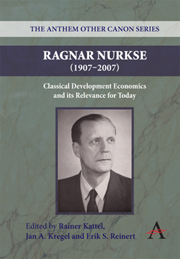Book contents
- Frontmatter
- Contents
- Preface
- Title in the series
- 1 The Relevance of Ragnar Nurkse and Classical Development Economics
- 2 Life and Time of Ragnar Nurkse
- 3 Nurkse and the Role of Finance in Development Economics
- 4 Early Development Theory from Sun Yat-sen to Ragnar Nurkse
- 5 The Roots of Unequal Exchange: Mihail Manoilescu and the Debate of the 1930s
- 6 Nurkse and the Early Latin American Structuralists: A Reflection on Development Theory, Industrialization and their Relevance Today
- 7 Lewis, the Long Wave and Industrialization in the Periphery
- 8 Ragnar Nurkse and the Law & Economics of Development
- 9 Ragnar Nurkse's Development Theory: Influences and Perceptions
- 10 Nurkse meets Schumpeter: Is Microfinance a ‘Silver Bullet’ to Economic Development?
- 11 Stockpiling of International Reserves and Development: a Misguided Link
- 12 International Currency Experience and the Bretton Woods System: Ragnar Nurkse as Architect
- 13 Some Reflections on Nurkse's Patterns of Trade and Development
- 14 India and Development Economics: External Influences and Internal Responses
- Notes
6 - Nurkse and the Early Latin American Structuralists: A Reflection on Development Theory, Industrialization and their Relevance Today
Published online by Cambridge University Press: 05 March 2012
- Frontmatter
- Contents
- Preface
- Title in the series
- 1 The Relevance of Ragnar Nurkse and Classical Development Economics
- 2 Life and Time of Ragnar Nurkse
- 3 Nurkse and the Role of Finance in Development Economics
- 4 Early Development Theory from Sun Yat-sen to Ragnar Nurkse
- 5 The Roots of Unequal Exchange: Mihail Manoilescu and the Debate of the 1930s
- 6 Nurkse and the Early Latin American Structuralists: A Reflection on Development Theory, Industrialization and their Relevance Today
- 7 Lewis, the Long Wave and Industrialization in the Periphery
- 8 Ragnar Nurkse and the Law & Economics of Development
- 9 Ragnar Nurkse's Development Theory: Influences and Perceptions
- 10 Nurkse meets Schumpeter: Is Microfinance a ‘Silver Bullet’ to Economic Development?
- 11 Stockpiling of International Reserves and Development: a Misguided Link
- 12 International Currency Experience and the Bretton Woods System: Ragnar Nurkse as Architect
- 13 Some Reflections on Nurkse's Patterns of Trade and Development
- 14 India and Development Economics: External Influences and Internal Responses
- Notes
Summary
Introduction
The open economies context implies increasing globalization and interdependence between countries and a reconfiguration of industrial powers and, hence, of prevailing international equilibria. The rise of China and India are only two examples of this tendency. At the same time, we are facing the emergence and the consolidation of new technological paradigms, mainly information technology, biotechnology and nanotechnology, which are engendering a radically different meaning and scope of what has been traditionally called ‘industrialization’. The borderline between science and business is continuously redefined, and it is increasingly less sharp. Intangibles and knowledge are more and more relevant, and the reshaping of intellectual property regimes at a global scale amplifies this tendency.
This set of broad reconfigurations of dominant actors, prevailing technological paradigms and new international trade and production rules redefines the opportunities and the constraints for development, which, unfortunately is still a goal to be reached in many regions of the world. Reports on the state of the world abound with figures showing the persistency of poverty, the marginal participation of developing countries to global trade and the poor quality and articulation of production structures in developing economies.
Classical development economists shared the perception that developing economies differ in major structural ways from developed economies, mainly, in their dependence on exporting primary products, and in their technological backwardness (Prebisch 1950, Hirschman 1958, Myrdal 1956, Nurske 1953a, Lewis 1954, among others).
- Type
- Chapter
- Information
- Ragnar Nurkse (1907–2007)Classical Development Economics and its Relevance for Today, pp. 119 - 146Publisher: Anthem PressPrint publication year: 2009



